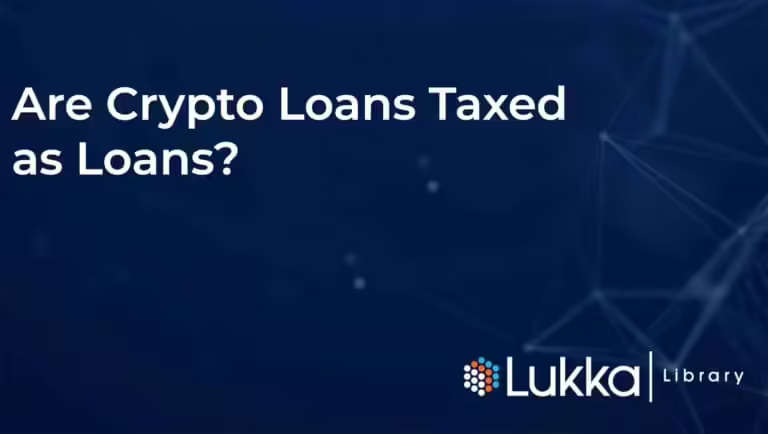
Author: Andrea S. Kramer, McDermott, Will and Emery*
Date: April 22, 2020
The number and types of transactions involving the borrowing and lending of units of virtual currency (“crypto loans”) are increasing rapidly, while the taxation of such transactions remains unclear. In this Memorandum, I discuss the tax issues posed by two common types of crypto loans and make some suggestions for supporting the taxation of these transactions as loans, not taxable sales or exchanges of property.
At the date of this Memorandum, neither the Treasury nor the IRS has provided any tax guidance with respect to crypto loans. Moreover, these transactions are not directly covered by any existing Code provisions, Treasury regulations, or IRS pronouncements.1 As a result, to understand the tax issues surrounding crypto loans, we must analyze them in accordance with broad, general tax principles established by case law as well as government guidance in other tax areas.
Although there are many questions about the tax treatment of crypto loans, this Memorandum addresses one basic question: are the transfers of virtual currency at the beginning and end of a crypto loan taxable at the time of the transfers, or are only the fees or interest paid and received in connection with the transaction taxable. The answer to this question is by no means free from doubt.
What is a Loan for Tax Purposes?
Let’s start with the question of what clearly qualifies as a loan for tax purposes. A loan is an indebtedness that is an existing, unconditional, and legally enforceable obligation for one party (borrower) to pay a sum certain of money on demand or on a specified date to the other party (lender).2 For example, the borrower might borrow money from the lender, pay interest for the use of that money, and agree to repay the money at a future date. Entering into such a loan is not taxable to either the borrower or the lender, nor is the repayment of the principal amount of the loan. The receipt or accrual of interest on the loan is, however, taxable as “compensation for the use or forbearance of money.”3 Although the term “interest” is not defined in the Code, it is generally viewed as a payment in return for the use of money or other property and is taxable as ordinary income 4 to the lender. The Supreme Court has also described interest as the “amount which one has contracted to pay for the use of borrowed money.”5 The borrower’s payment of interest is not, however, deductible if the loan is for the borrower’s personal use and may be subject to certain limitations if it is for investment or business purposes.
The major difficulty in treating crypto loans as loans for tax purposes is IRS Notice 2014-21, which states that (at least as far as the IRS is concerned) convertible virtual currency is property,6 and according to established case law, a loan for tax purposes is an “a debt [that] necessarily involves an obligation to pay money and not an obligation to deliver property.”7
What Happens If a Crypto Loan is Not Treated as a Loan?
In general, a transfer of money in exchange for property is treated as a taxable sale or exchange of property. As such, there is an immediate recognition of gain or loss on the exchange. Gain from a sale equals the excess of the amount realized over the seller’s adjusted basis. Loss from a sale equals the excess of the seller’s adjusted basis over the amount realized.8
If a crypto loan is deemed to be a sale or exchange of property and not a loan, the transaction would be broken into two separate transactions: the initial transfer of the virtual currency at the opening of the “loan” and the return of the virtual currency upon closing the “loan.” For a discussion of how tax basis is calculated for virtual currency transactions, see McDermott’s Memorandum, “Specific Identification of Virtual Currency Positions.”
Two Common Types of Crypto Loans
The first type of crypto loan—I call this a “Crypto Borrow Transaction”— involves one party (the borrower) borrowing virtual currency from another party (the lender) with the borrower posting collateral (cash, another type of virtual currency, or other agreed upon property). The borrower agrees to return to the lender an identical amount of the same virtual currency at the end of the agreement and the lender agrees to return the collateral. Crypto Borrow Transactions are typically structured to resemble securities lending transactions that are subject to a specific Code provision that prevents gain or loss on the transfer of securities.9 The borrower is free to sell or otherwise dispose of the virtual currency subject to the loan, and the lender is often allowed to sell or otherwise dispose of the collateral. If during the term of the agreement there is an airdrop or hardfork with respect to the particular virtual currency that was borrowed, the borrower transfers back to the lender units of virtual currency identical to that which was received in the airdrop or hardfork (not money or other property). In many Crypto Borrow Transactions, the borrower or lender (or both) can terminate the agreement on demand, or on a specified number of days’ notice.
In the second type of crypto loan—I call this a “Crypto Collateral Transaction” — lender loans the borrower fiat currency (such as U.S. dollars) and the borrower posts virtual currency (such as Bitcoin, Ether, or a highly liquid virtual currency) with the lender as collateral. A principal objective of these transactions is for the borrower to monetize a virtual currency position without triggering a taxable sale. These transactions are relatively straightforward. The borrower borrows U.S. dollars from the lender and posts virtual currency as collateral. When the loan matures, the borrower re-pays the lender the dollar amount of the loan plus interest, taking back identical virtual currency to that which the borrower had posted as collateral. If during the term of the loan there is an airdrop or hardfork, the lender must transfer to the borrower virtual currency units identical to what is received in the airdrop or hardfork (not money or other property). In a Crypto Collateral Transaction, there is often a fixed term, but the borrower can repay the U.S. dollar loan prior to maturity.
Considerations to Bolster Arguments that a Crypto Loan is a Loan, Not a Sale or Exchange of Property
Because of the importance that the tax law places on the substance of a transaction rather than its form, taxpayers must carefully examine the terms of each crypto loan to determine whether the transaction is more likely to be taxed as a sale or exchange of property or as a loan. Some of the key tax factors to consider when addressing the proper taxation of particular crypto loan transactions follow:
- Consider the benefits and burdens of tax ownership as a result of the transaction. To the extent to which “ownership” of the virtual currency is deemed transferred at the opening of the crypto loan, the position that the transaction being taxed as a sale or exchange of property is straightforward.
- The following factors, as set out by the Tax Court in Grodt & McKay, are generally considered in evaluating tax ownership.10
- whether legal title passes;
- how the parties treat the transaction;
- whether an equity interest is acquired in the property;
- whether the contract imposes a present obligation on the seller to execute and deliver a deed and a present obligation on the purchaser to make payments;
- whether the right of possession is vested in the purchaser;
- which party pays the property taxes;
- which party bears the risk of loss or damage to the property; and
- which party receives the profits from the operation and sale of the property.
- which party pays the property taxes;
- which party bears the risk of loss or damage to the property; and
- which party receives the profits from the operation and sale of the property.
In evaluating these factors, the courts do not generally regard any one factor as determinative and recognize that not all factors are relevant in a given case.11 The important point, however, is that the more factors that point the holder of the virtual currency after implementation of the transaction as being the “owner” of the virtual currency, the more the transaction looks like a sale, not a loan.
- If the crypto loan is fully recourse, this points to the transaction being viewed as a loan.
- The crypto loan should be structured and documented as a traditional loan transaction, and the parties should adhere to normal loan practices.
- The parties should treat the transaction as a loan in their records and on their tax returns.
- The repayment should be made in virtual currency units that are identical in value and denomination to the virtual currency that is transferred at the start of the transaction. The same rules should apply to any airdrops or hardforks that happen during the terms of the transaction.
Other Possible Approaches to Avoiding a Crypto Loan Being Taxed As a Sale or Exchange of Property
The possibilities include:
- The borrower did not receive back property that was materially different either in kind or extent and, therefore, there should be no recognition under Treas. Reg. § 1.1001(a).
- The transaction qualifies as a securities loan eligible for tax-free treatment under I.R.C. § 1058.
- The transaction qualifies as a loan under the tax authority addressing repurchase agreements and reverse repurchase agreements.
- The transaction is structured as a bailment transaction so that the bailor deposits fungible virtual currency with the bailee and the virtual currency is comingled with the goods of the bailee, so that when different but identical virtual currency is returned to the bailee it is not a taxable sale.12
* * * *
Taxpayers should carefully consider the tax factors that support treating their crypto loans as loans for tax purposes. They should carefully consider their transaction documents; keep detailed and accurate records of their transactions; and discuss their transactions with their tax advisors to determine the appropriate tax reporting.
In addition, crypto exchanges, wallet providers, and custodians must consider these issues as they determine appropriate Form 1099 reporting obligations with respect to Forms 1099-B, 1099-MISC, or 1099-INT. Such entities must also consider withholding taxes for foreign persons because gain is not treated as fixed, determinable, annual, or periodic income although income is.13
1 For a discussion of whether virtual currency can be a security for tax purposes, see McDermott’s Memorandum, “Can Virtual Currency Be a Security for Tax Purposes?” As to whether virtual currency can be a commodity, see McDermott’s Memorandum “Can Virtual Currency be a Commodity for Tax Purposes?
2 See Kovtun v. Comm’r, 54 T.C. 331 (1970), aff’d per curiam, 448 F.2d 1268 (9th Cir. 1971), cert. denied, 405 U.S. 1016 (1972); Titcher v. Comm’r, 57 T.C. 315 (1971).
3 Deputy v. DuPont, 308 U.S. 488 (1940)
4 I.R.C. § 61(a)(4).
5 Old Colony Railroad Co. v. Comm’r, 284 U.S. 552 (1932), rev’g 50 F.2d 896 (1st Cir. 1931), rev’g 18 B.T.A. 267 (1929).
6 Notice 2014-21, Q&A-2. For a discussion of the legal effect of IRS pronouncements, see McDermott’s Memorandum, “Legal Effect of IRS Pronouncements on Virtual Currency.”
7 R.S. Stahl v. U.S., 441 F. 2d 999 (1970).
8 I.R.C. § 1001(a).
9 I.R.C. § 1058.
10 Grodt & McKay Realty, Inc. v. Comm’r, 77 T.C. 1221 (1981).
11 See, e.g., Honeywell Inc. v Comm’r, T.C. Memo. 1992-453 (“The passing of legal title is among the factors to be considered in determining whether a sale has occurred for Federal income tax purposes… Because it is only one factor, however, it is not determinative”); see also Torres v. Comm’r., 88 T.C. 702 (1987) (“in analyzing the transaction in this case, we first note that some of the factors enumerated in Grodt & McKay Realty, Inc… are either less relevant in this case or must be considered in a different light….”).
12 G.C.M. 35183 (Jan. 2, 1973). 13 Treas. Reg. § 1.1441-2(b)(2)(i).



